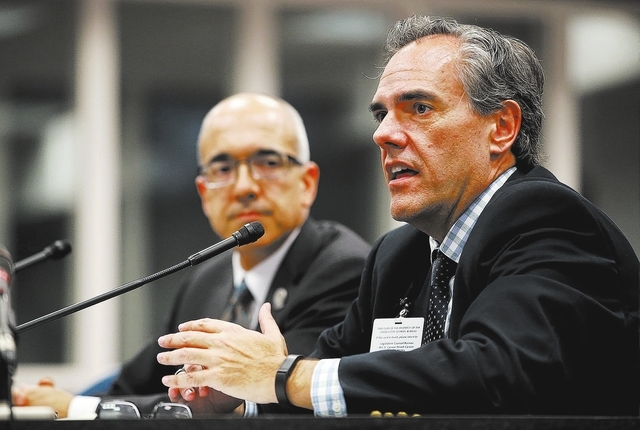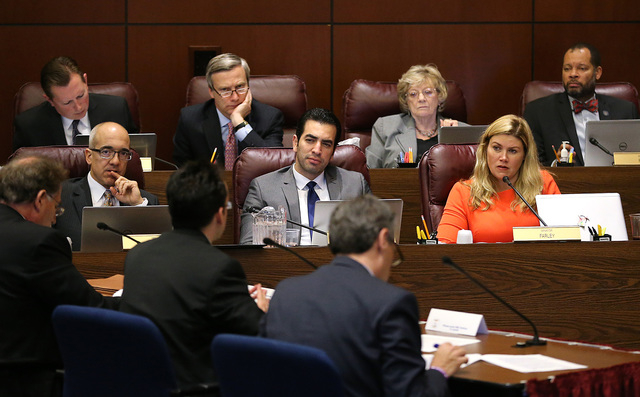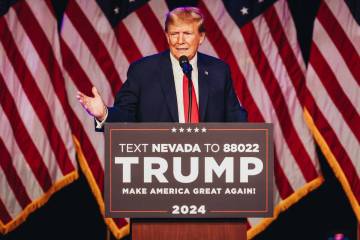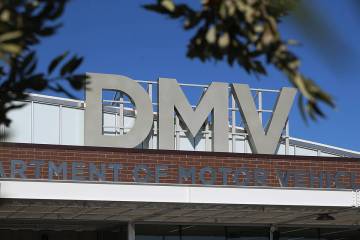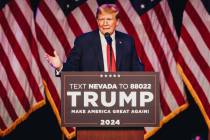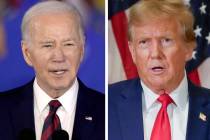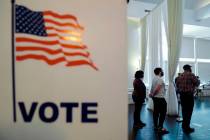Senate OKs teacher scholarship, incentive bill, sends it to Assembly
CARSON CITY — The Senate on Wednesday passed a bill that would start a teacher scholarship program and pay incentives to Nevada educators in hard-to-fill jobs.
The $15 million initiative is intended to address the state’s teacher shortage. It now goes to the Assembly.
Senate Bill 511 is a key part of Republican Gov. Brian Sandoval’s education agenda this legislative session that includes creating high-performance schools across the state. But officials also acknowledge that education reform efforts will fall flat without a competitive means of recruiting and retaining teachers.
The bill, which has wide bipartisan support, easily passed the Senate with an 18-0 vote, with three absent. The bill had unanimously passed the Senate Committee of the Whole earlier in the day.
Senate Majority Leader Michael Roberson, R-Henderson, said the Clark County School District’s nearly 700 teaching vacancies translate into about 40,000 students without a real teacher.
He said the district’s teacher shortage, which started the school year with some 2,600 teaching vacancies, is held together “with duct tape and long-term substitutes.”
The bill has a two-pronged approach: attracting more people to pick teaching as a career and giving incentive pay to educators who choose to work in disadvantaged schools.
Disadvantaged schools are Title 1 schools, those that serve large economically disadvantaged student populations, and one- and two-star schools, which rank in the bottom 25 percent of schools under Nevada’s accountability system.
Dale Erquiaga, state superintendent of public instruction, told the committee that many programs Sandoval has proposed rely on high quality teachers.
“Those initiatives will fail, we fear, without addressing the shortage of teachers in schools,” he said.
The incentive would give $5,000 annually for each of the first two years to teachers who work at disadvantaged schools.
That two-year period would give teachers time to develop an appreciation and commitment to their school, said Joyce Haldeman, a Clark County schools lobbyist.
The state would give scholarship money to public and private colleges and universities in Nevada. Universities would apply to the state to receive the scholarship funding, outlining the planned number of recipients and the type of teaching program the scholarships will go toward. Students would apply for the scholarships with the schools.
The Teach Nevada Scholarship Program, is tailored toward students who plan to teach in Nevada schools.
It would award up to $3,000 a semester, which is up to $24,000 for a student during a four-year period.
The universities would disperse 75 percent of the scholarship funding while the students are in school and hold the remaining 25 percent. After scholarship recipients have taught in Nevada schools for five years, they could claim the remaining 25 percent of the scholarship money.
Not all scholarship recipients would need to be incoming freshmen. Students who change their major or have completed some college courses would be eligible to apply, as would nontraditional students with a bachelor’s degree who are changing careers.
The bill designates $2.5 million for each of the next two fiscal years for scholarships, or $5 million total. It also calls for $5 million for each of the next two years for teacher incentives.
The bill has widespread support from the education community, including the Clark County Education Association and the Nevada Association of School Boards.
Contact Ben Botkin at bbotkin@reviewjournal.com. Find him on Twitter: @BenBotkin1.



